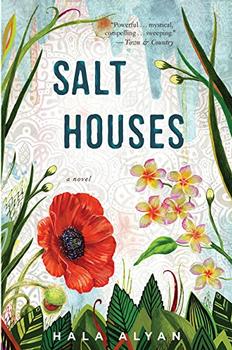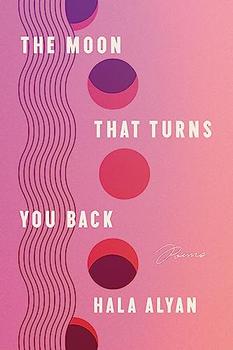Summary | Excerpt | Reading Guide | Discuss | Reviews | Beyond the book | Read-Alikes | Genres & Themes | Author Bio

Salt Houses is the story of a Palestinian family living in Nablus; it begins on the eve of the youngest daughter Alia's wedding. Her mother reads her daughter's coffee cup grains, withholding from everyone what she has actually seen. This sets the novel in motion, with its implicit suggestion of unspoken misfortune. No one in the family knows the fate that awaits them, a destiny that will be shared by a significant portion of the Palestinian population, as they are continuously displaced from one town or village to another, and from one country to another.
Each chapter of Salt Houses is titled with the name of one of the family members, as well as the city and the year, beginning with Alia's mother, Salma, in Nablus in 1963. Nablus is the town Alia and her family fled to from Jaffa in 1948, the year of the Nakba when Alia was three years old. The Nakba (literally "Catastrophe") is the term used by Palestinians to describe the mass exodus of over 700,000 Palestinian Arabs who were expelled or fled from their homes during the 1948 war with Israel. It is the first expression of homesickness subsequent generations will suffer:
"Salma missed her home with a tenacity that never quite abated. She spent the first few years in Nablus dreaming of returning."
Alia and her brother, Mustafa, are happy in Nablus. Then Alia visits her older sister in Kuwait in 1967 and ends up staying because of the Six Day War in Palestine. Her husband, Atef, joins her and so they, too, experience a longing for days gone by; nostalgia for places and memories their children won't experience. Atef grieves for a long period, until he finds comfort and healing in the unsent letters he writes that will become an unintended legacy to his grandchildren:
"Nostalgia is an affliction. Someone had said that once in front of Alia, and the words reach her now, years later. Like a fever or a cancer, the longing for what had vanished wasting a person away. Not just the unbearable losses, but the small things as well."
Readers travel through each section of the narrative – from country to country – with a different family member. The story jumps forward in time, often skipping years, to coincide with significant events, both historical and familial, which keeps the storytelling compelling and intriguing. In this way, writer Hana Alyan creates a unique perspective of the effect of political conflict on families. Rather than bringing readers to the brutality of war, we bear witness to the separation of a family from its roots, placing us inside the heart of one particular family. We follow Alia to Amman and her children to Paris, Manhattan and Beirut; all places where they struggle to belong, and to feel at home. The longer they stay in a place, the more they experience the generational rift between parents who lived one kind of childhood and their children who grow up in another.
Salt is ever present throughout the novel. It appears in memories of Alia's family living near the sea, but then displaced inland; it shows up then in the description of a father who "salted everything after that, even his water"; in houses that were eroded by salt; and in lives, both soothed by and, on the other end of the spectrum, almost taken by immersion in salt water.
Alyan allows her readers to see, not only the dreadful hardships and the struggle of refugees risking their lives to find freedom and to survive, but how they finally fare at the end of their journey. Alia's family finds good jobs, and they are able to continue with higher education in their host countries, but the displacement from their home – their place of origin – binds their histories; they each inherit the bittersweet yearning to return to the familiar, and so each generation of their family grows up within a different culture that they come to think of as a home – an uninhabitable identity they are both distant from and connected to. One of the few cultural traditions that does survive their separation is food. For instance, Alia's daughter Riham makes Makloubeh (see Beyond the Book) when she visits, which is Alia's favorite. And everyone's favorite dessert is kanafeh.
The novel explores the resilience of humanity to survive and the sacrifice that is often made; the cultural poverty that refugees experience, giving rise to the insatiable desire for families to remain connected to each other; and the small things that bring comfort and joy – the rice dishes, the olive and the orange tree, the desire to keep flowers blooming. Their homes may crumble, but their spirits continue to reignite, wherever their heads shall lie.
![]() This review was originally published in The BookBrowse Review in May 2017, and has been updated for the
June 2018 edition.
Click here to go to this issue.
This review was originally published in The BookBrowse Review in May 2017, and has been updated for the
June 2018 edition.
Click here to go to this issue.

If you liked Salt Houses, try these:

by Amira Ghenim
Published 2025
A finalist for the 2021 International Prize for Arabic Fiction, a compelling saga of two families that illuminates the lives of women in modern Tunisia.

by Hala Alyan
Published 2024
From the author of The Arsonists' City and The Twenty-Ninth Year, a new collection of poetry that traces the fragmentation of memory, archive, and family–past, present, future–in the face of displacement and war.
Your guide toexceptional books
BookBrowse seeks out and recommends the best in contemporary fiction and nonfiction—books that not only engage and entertain but also deepen our understanding of ourselves and the world around us.